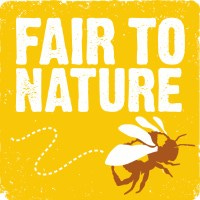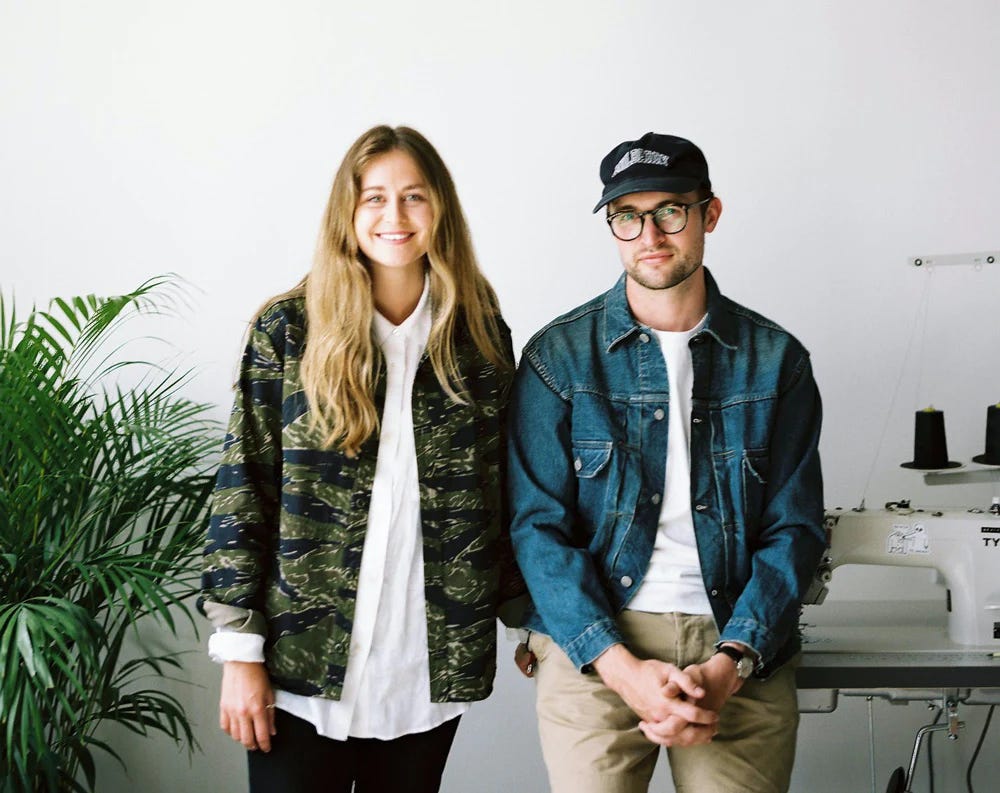🌱 Grab Your Jacket: Launching our Festive Fundraiser Event (free on 1st December?) and looking at Paynter Jacket Co.
Featuring Paynter Jacket Co, Notpla, Isle of Wight Distillery and more...
Happy Monday!
This week, we’re excited to announce our first event in partnership with Raye the Store and supporting City Harvest London.
When: Thursday 1st December, 7-9pm
Where: Raye the Store, 310-312 Regents Street, London, W1B 3AU
800,000 children face food poverty across the UK, half of those reside in London where a staggering 1 in 4 can't afford to eat. City Harvest London exists to help these people, and we’re thrilled to be supporting them via a festive fundraiser. 100% of ticket sales will support The City Harvest Big Give Christmas Challenge 2022 - with every pound we raise as a community being doubled by The Big Give. So, join us to celebrate the steps you’re taking towards becoming a more sustainable business, and help City Harvest tackle food poverty at the same time.
How does it work? When you buy a ticket you’ll get the opportunity to donate any sum you feel comfortable with at the checkout. Your donation will be doubled as part of the Big Give challenge, so every £10 donated turns into £20 - which provides 80 healthy meals this winter.
This week we cover:
Quick Take: Strengthen your sourcing roots via the RSPB’s newly expanded Fair to Nature certification.
Brand Spotlight: Slow Fashion, Fast Sales: Paynter Jacket Co
In case you missed it: 🌱 Our COP27 Calendar: Your guide to what's happening, when.
> Good News Last Week
🎯 Elvis & Kresse announced they’ve completed construction on their new HQ. It’s powered by renewable energy (it’s 91% self sufficient), is built to ‘passive’ construction standards with straw bales, harvests rainwater and a wetland based sewage treatment system. They’ve also planted 3000 trees onsite.
🎯 Notpla unveiled their partnership with ID Genève Watches to create the first home-compostable packaging made of seaweed in luxury watchmaking industry. Their new packaging solution, Notpla Rigid, uses the fibrous by-product of the industrial processing of seaweed.
🎯 Isle of Wight distillery and Pieminister have both announced that they’ve obtained B Corp certification.
⭐️ Arla has called on the government for more investment to increase biofuel production from farm waste, after their investment in the energy source is now powering seven trucks.
⭐️ Absolut Spirits announced their plans for a partially hydrogen-fired glass furnace for large scale production of their glass bottles. They’re working with Ardagh’s Limmared glassworks (part of Ardagh Group) to replace 20% of current natural gas and electric power with green hydrogen. This is part of their commitment to become carbon neutral by 2030.
⭐️ Morrisons announced their partnership with Heinz to ‘Ask for Henry’. Those needing a helping hand this half term, amongst the cost of living crisis, can head to any Morrisons Cafe and ‘ask for henry’ to receive 1 Heinz Beans meal per person per day, no questions asked .
⚡️ Ecosia announced it’s officially a ‘steward-owned company’, meaning that shares can’t be sold at a profit or owned by people outside of the company, and no profits can be taken out of the company either. This is legally binding and irreversible, and cements their commitment to being driven by maximum impact.
⚡️ RSPB announced they’ve extended their Fair to Nature food and farming certification scheme to cover dairy, livestock, horticultural and wine producers. Established in 1989 and previously only available to arable farmers, it is the only UK food and farming certification scheme with a focus on biodiversity and reversing nature loss.
> Click on each link to read more.
> Quick Take
Strengthen your sourcing roots via the RSPB’s newly expanded Fair to Nature certification.
The UK is ranked in the bottom 10% in the world for biodiversity, and is the worst among G7 nations. With biodiversity loss at nearly 50% since the Industrial Revolution, we risk a full ‘ecological meltdown’. Amongst other potential damages, the loss of biodiversity throughout the UK poses a threat to the stability of your business’ supply chains. However, working with your suppliers to improve biodiversity is a challenge, and maintaining standards your brand can then support is even harder.
Introducing Fair to Nature: the biodiversity farming standard that requires farmers to ‘create and/or actively manage a specified range of high quality wildlife habitats, and manage their soils, crops and livestock in ways that support nature’. It’s based on scientific evidence demonstrating that a certain required quantity and quality of habitat leads to a significant increase in biodiversity.
Relaunched and expanded just last week, the standard (previously only available to arable farmers) is now available to dairy, livestock, horticultural and wine producers too.
Let’s take a look at just a few of the requirements:
Conservation and Habitats: At least 10% of the farmed area is managed as a range of wildlife habitats and features. An example of one specification of this is ‘open flower-rich habitats’ comprising no less than 4% of the farmed land.
Soil Management: At least one management technique is undertaken to increase or maintain a high Soil Organic Matter.
Carbon Management: Fair to Nature farms must undertake a full farm carbon footprint assessment at the start of the scheme, and repeat this every four years.
Livestock Management: A Livestock Health and Welfare Plan must be established and implemented to manage and improve health and welfare. This should be reviewed annually by a vet.
Pesticide Management: Pesticide records show use is lower than average for each crop or shows a progressive decrease over time.
Fertiliser & Manure Management: Peat or peat-based composts should not be used on the farm.
Water & Pollution Management: Identify specific risks to water quality in your catchment area (pesticides and nutrients) and plan how to minimise or mitigate use of these inputs.
Additionally, a strong focus on training farm staff is essential to the certification. An Induction Training Course has to be completed by relevant farm staff, with a future training plan in motion too.
How is it monitored?
Every two years, a Fair to Nature Habitat Assessment via an approved advisor will be conducted. Each farm with a supply contract will also undergo a verification audit every two years too. Unlike other certifications, Fair to Nature applies to the entire farm - so all crops and produce will be included in any assessment.
Additionally, the standards themselves are regularly reviewed by the Fair to Nature Technical Advisory Panel.
Why should your business consider the Fair to Nature standard?
Fair to Nature partners with farms prioritising biodiversity, helping you connect with farms that meet high ecological standards, so sourcing more sustainably is that little bit easier. Additionally, like many certifications, the Fair to Nature logo helps communicate your commitment to your customers. Brands who buy from Fair to Nature certified farms can display the logo on the packaging of certified products.
So far, Fair to Nature is the only UK certification scheme tackling the biodiversity crisis. Owned by the RSPB Wildlife Charity, the UK’s largest wildlife and conservation charity, it’s fair to say that Fair to Nature has some pretty strong roots too.
> Brand Spotlight
Slow Fashion, Fast Sales: Paynter Jacket Co
With an estimated 80 to 150 billion garments being produced every year, the fashion industry is on a path to create more, at a lower cost and faster than ever before. Enter Paynter Jacket Co - a unique and refreshing approach to crafting garments that will both stand the test of time and keep customers coming back for more. How? Limited edition jackets, made in batches, and available only four times a year.
Batch No.1 launched on 11th May 2019, comprising just 300 jackets and thousands of people on a waitlist. It sold out within 14 minutes. Slow fashion? Not really. Let’s dig in.
Business partners and real life partners, Huw Thomas and Becky Okell combined their respective backgrounds at Hiut Denim Co and Nike to bring Paynter to life in 2018 (learn more about their journey here). Now, what’s ‘started as an experiment’ has a cult following - not just for the quality of their clothes, but also for their approach; made to order garments, closed loop processes and bringing customers on the journey of their jacket.
Slow fashion, fast sales
Paynter Jacket Co releases each batch at 9am on a Saturday (UK time) - each with a unique design, fabric and quantity. Once orders are in, they’ll then start manufacturing, with each jacket taking 6-8 weeks to be made. Avid email subscribers can even support the company in more accurately predicting how much fabric they’ll need by placing a ‘fabric deposit’ - guaranteeing a jacket before the fabric weaving process even begins. Each fabric deposit is £75, the window to place a deposit is open over 72 hours, and the deposit itself is taken off the order when colour and size are chosen at launch.
Each jacket is designed in East London, before being made by a small family run factory in Northern Portugal. Each is also hand numbered, with each label telling the unique story of that batch and that garment. Unusual for any consumer goods company, there’s no stock room for Paynter Jackets. Only making what’s ordered means that there’s also no waste. By the time the fabric is cut, it’s already destined to go to a loving home and has someone’s name on it. That’s rare. Slow fashion? Yes and no - batches have sold out in as little as 86 seconds.
Going one step further (or, if you wall, smaller), Paynter even launched ‘Micro Batches’ with as little as 25 jackets available via raffle, as a way to test fabric and styles - their Patchwork Applecross Jacket is a good example. Since then, they’ve launched 12 batches in 3 years - check out the full archive here.
Keeping a closed loop
On the small chance jackets are returned, they’ll simply be redistributed to new homes on a waitlist basis. Even offcuts from the making process are recycled into new thread.
Occasionally, Paynter Jacket Co will do collaborations with any offcuts or product that can be repurposed - Paynter x Greater Goods is the perfect example. Made up of only 12 pieces, two jackets with tiny flaws were re-constructed to form three tote bags, one side bag and eight bottle bags.
Bring customers on the journey of each jacket
At every stage of a jacket’s journey, the customer is taken along. Weekly videos and content of fabric being made, or jacket’s being sewn, give the customer a glimpse into the life of their item before it’s even in their hands. It’s equally fascinating and refreshing - earning Paynter an email subscriber list with thousands of people desperate to get their hands on the next batch. With Paynter jackets worn in 41 countries, an increasingly global audience gets a glimpse into the company itself - like their live reactions when Batch 3.5 went live and sold out.
Paynter also focuses on an area many brands miss - educating their consumer. Teaching customers about the items they’ll be wearing encourages them to understand their heritage and the importance of taking care of their items. Batch No 9 is a great example - read here, here and here.
Don’t mind us, we’re just watching our emails for news of their next drop…
Support Paynter Jacket Co:
> In case you missed it
🌱 Our COP27 Calendar: Your guide to what's happening, when.
> Follow up with…
Press Release: It’s not too late to reverse biodiversity decline by 2030, UK’s five leading nature bodies say
Podcast: Sustainable Food Trust Podcast
Resource: Zero Carbon Forum
Event: Project 101 - Lessons from Tony's Chocolonely with Ben Greensmith - 30th November






